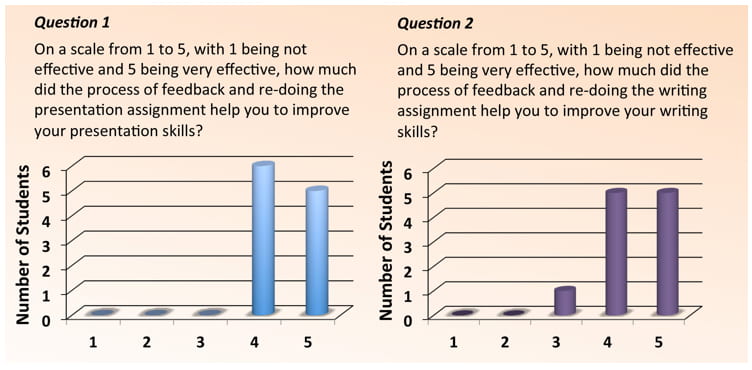Thilo HAGEN
Department of Biochemistry, Yong Loo Lin School of Medicine (YLLSOM)
Thilo reflects on how the inclusion of a formative component into the writing assignment of his postgraduate course has been beneficial in enhancing his students’ writing skills.

Photo by Kenny Eliason on Unsplash
Hagen, T. (2023, August 29). Transforming a postgraduate course writing assignment to improve student learning. Teaching Connections. https://blog.nus.edu.sg/teachingconnections/2023/08/28/transforming-a-postgraduate-course-writing-assignment-to-improve-student-learning/
I have dreaded the end of every semester because it meant sitting in my office grading writing assignments with only one purpose, to assign grades. Although I also provide feedback, it goes mostly unnoticed, because at the end of the course students rarely care about anything other than their final grades. What is more, it is disappointing to realise that for some students our teaching has made little impact. Even if students did well, there was no way of telling whether this was a result of our learning activities.
We have had an excellent experience with adopting a formative approach for a different assignment in our postgraduate course, a “3MT Three-minute Thesis”1 presentation. Here, students give an initial presentation to which lecturers and their fellow course mates provide detailed feedback. The students then revise their talk and present again. This formative setup has proved exceptionally effective. We as lecturers never fail to be astonished by the improvements that students exhibit during the final round and the amazing standards many achieve with their revised presentations.
Encouraged by this experience, we made an analogous change to our writing assignment in Semester 2, AY2022/23. In the assignment, students normally write a research paper based on a set of fictional data, followed by a summative evaluation with some verbal feedback via email at the end of the semester. To make this assignment formative, students submitted an initial draft, to which feedback was provided, followed by the final graded submission (see Figure 1).
 Figure 1. Formative feedback activities incorporated into the writing assignment workflow for the postgraduate course.
Figure 1. Formative feedback activities incorporated into the writing assignment workflow for the postgraduate course.
In this post, I discuss two questions:
- Did the formative setup of the writing improve student learning?
- How did the formative approach affect my workload (as a course instructor)?
While in our oral assignments all students showed dramatic improvements, the extent of improvement in the writing assignment varied. Some students showed remarkable improvements while others did not. Whether the formative round was effective likely depended on how much effort the students spent revising their manuscript based on the personal and general feedback provided. Hence, the formative stage is an opportunity for students to improve, but with no guarantee that all students will achieve an improvement.
When comparing the oral and writing assignment there is one notable difference. The motivation to do well in the final round of the oral presentation is high because the quality of the final presentation is visible to both the lecturers and their course mates. A similarly strong incentive is absent in our writing assignment.
How can we provide such an incentive? Potential approaches are to announce the students who produced the best writing assignment and showed the greatest improvement compared to Round 1 (and perhaps award them with a prize), and to make all manuscripts accessible to the other students and use peer grading to let students vote for the best assignment.
What did the students themselves think about the formative approach? In a survey conducted at the end of the course, we asked students to what degree the formative feedback process helped them in improving their presentation and writing skills. The survey findings are reflected in Figure 2.

Figure 2. Students’ responses to the survey on the extent to which the formative feedback process enabled them to improve their presentation and writing skills.
Consistent with our own perceptions as lecturers, the students felt that the presentation feedback round was useful. Encouragingly, they gave an almost equally favourable evaluation of the writing assignment format. The positive response was also evident in the qualitative student feedback given at the end of the semester:

When considering these results, it is important to keep in mind that the students had to do two submissions, almost double the amount of work. Yet, they still gave a favourable response in the anonymous survey and hence likely truly found the assignment format to be helpful.
How did the new format affect my workload? Surprisingly, the time required for marking did not change compared to previous academic years, despite having to mark the essays twice. The is because in the two submissions, I focussed on different aspects. In the first submission, I only focussed on providing feedback and not on grading. In the second submission, I only focussed on checking if students applied the feedback.
What was hugely different, however, was my experience of the marking process. I was highly motivated to read the first submission because I expected that students would be applying my personal feedback, and because I would get to talk about individual examples in the writing feedback sessions. Not having to grade the initial submissions eliminated stress associated with the need to be objective and fair, maintain the same standard throughout the marking process, and justify my grades based on the provided feedback.
Grading the final submissions was also relatively easy. I no longer had to provide feedback, because learning had already occurred. My main marking criterion became whether the students applied the feedback and whether this resulted in a good assignment. I was also curious to find out whether students had shown improvements in their writing skills.
In summary, when planning complex assignments, it is not only important that feedback is provided, but also when. Feedback is most effective if provided before the final evaluation, because only then will students be motivated to learn from the feedback. This in turn makes the marking of assignments more meaningful and easier for the lecturer. There are instances where providing formative feedback is not possible, for instance when the class size is large. Here I recommend using less complex assignments that focus on specific skills. While students need feedback to recognise which skills they lack or need to improve, they can learn specific skills on their own through repeated practice opportunities.
A potential outcome of evaluating assignments after a formative feedback stage is that most students may achieve the course learning outcomes. While in principle this is desirable, it creates problems when we have to grade students on a curve, which in small classes is usually not the case. If grading on a curve is required, including a mix of formative and summative assignments and assessments in a course is essential.
Endnote
- The Three Minute Thesis competition celebrates the exciting research conducted by Doctor of Philosophy students. In the competition, students give a short description of their PhD project that is geared towards a non-expert audience. Developed by The University of Queensland (UQ), 3MT cultivates students’ academic, presentation, and research communication skills. More information about the 3MT can be found on their website.
Acknowledgements
I would like to acknowledge Dr. Lee Seow Chong and Dr. Lee Zheng Wei for their contributions in teaching effective writing and presentation skills and in providing feedback to students.
 |
Thilo HAGEN is an Associate Professor at the Department of Biochemistry, Yong Loo Lin School of Medicine. In his scientific research, he is interested in how metabolic changes are involved in human diseases and how cell metabolism can be manipulated to design novel therapeutic strategies. In his teaching he focusses on introducing novel ways to promote active learning. Thilo previously contributed a post on introducing peer instruction in his online classes using the Learning Catalytics platform. Thilo can be reached at bchth@nus.edu.sg. |

